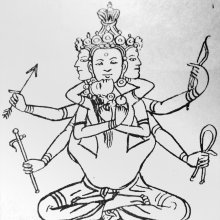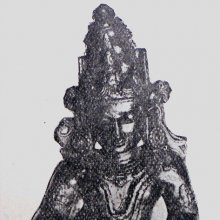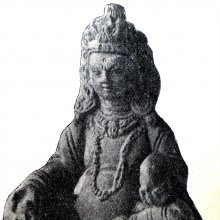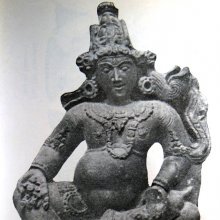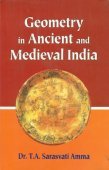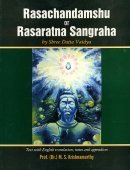Datta, Dātta, Dattā: 29 definitions
Introduction:
Datta means something in Buddhism, Pali, Hinduism, Sanskrit, Jainism, Prakrit, Marathi, Hindi. If you want to know the exact meaning, history, etymology or English translation of this term then check out the descriptions on this page. Add your comment or reference to a book if you want to contribute to this summary article.
Alternative spellings of this word include Datt.
Images (photo gallery)
In Hinduism
Purana and Itihasa (epic history)
Source: archive.org: Puranic EncyclopediaDatta (दत्त).—(dattaka) See under Dattātreya.
Source: Cologne Digital Sanskrit Dictionaries: The Purana Index1a) Datta (दत्त).—(Atri)—the son of the sage Atri and Anasūyā and an avatār of Viṣṇu according to Paurāṇikas; brother of Durvāsa; by worshipping him, the Yadus, Haihayas, etc., got knowledge of yoga.1 He knew Hari yoga,2 and followed Hari going to Pṛthu's sacrifice.3 A Siddha;4 worshipped by Arjuna (Haihaya), to whom he imparted yoga;5 in the tenth Tretāyuga the 4th incarnation with Markaṇḍeya as Purohita;6 was worshipped by Arjuna who got four boons from him one of which was 1000 hands;7 Śyāmas, Mudgalas, Gaviṣṭhias and others belong to this Vaṃśa.8
- 1) Bhāgavata-purāṇa II. 7. 4; IV. I. 15 and 33; XI. 4. 17; Brahmāṇḍa-purāṇa III. 8. 82; IV. 28. 89; Vāyu-purāṇa 70. 76-8.
- 2) Bhāgavata-purāṇa II. 7. 45.
- 3) Ib. IV. 19. 6.
- 4) Ib. VI. 8. 16; 15. 14.
- 5) Ib. IX. 15. 17; 23. 24; Brahmāṇḍa-purāṇa III. 30. 35; 34. 4; 38. 14; 40. 43, 57, 66; 69. 10; Matsya-purāṇa 43. 15.
- 6) Brahmāṇḍa-purāṇa III. 73. 88; Matsya-purāṇa 47. 242; 99. 14; Vāyu-purāṇa 98. 89.
- 7) Vāyu-purāṇa 94. 10-11; Viṣṇu-purāṇa IV. 11. 12.
- 8) Ib. I. 10. 8.
1b) A sage of the Svārociṣa epoch.*
- * Matsya-purāṇa 9. 8.
Datta (दत्त) (also known as Agastya) is the son of Pulastya and Prīti: one of the twenty-four daughters of Dakṣa and Prasūti, according to the Vaṃśa (‘genealogical description’) of the 10th century Saurapurāṇa: one of the various Upapurāṇas depicting Śaivism.—Accordingly, Ākūti was married to Ruci and Prasūti to Dakṣa. Dakṣa produced in Prasūti twenty-four daughters. [...] [Prīti was given to Pulastya.] Pulastya and Prīti had a son named Datta who was well known as Agastya.

The Purana (पुराण, purāṇas) refers to Sanskrit literature preserving ancient India’s vast cultural history, including historical legends, religious ceremonies, various arts and sciences. The eighteen mahapuranas total over 400,000 shlokas (metrical couplets) and date to at least several centuries BCE.
Kavya (poetry)
Source: Brill: Śaivism and the Tantric Traditions (kavya)Datta (दत्त) refers to “(being) barricaded (with an ivory-rod bolt)”, according to Bāṇa’s Kādambarī (p. 225).—Accordingly, while describing the shire of the Goddess Caṇḍikā, “[Then the portal to the sanctum sanctorum, a riot of colour and form:] She was being illuminated by the entrance, on which there were hanging cloths reddened by lamp-smoke, a row of bracelets made of peacock-throats festooned [over it], a garland of bells closely-set and pale with powdered flour-cakes, which supported two door-panels, [studded] with tin lion heads with thick, iron pins in their centers, barricaded with an ivory-rod bolt (datta-dantadaṇḍa-argala), carrying [what seemed to be] a necklace of sparkling bubbles that were mirrors oozing yellow, blue and red [light]”.

Kavya (काव्य, kavya) refers to Sanskrit poetry, a popular ancient Indian tradition of literature. There have been many Sanskrit poets over the ages, hailing from ancient India and beyond. This topic includes mahakavya, or ‘epic poetry’ and natya, or ‘dramatic poetry’.
Sports, Arts and Entertainment (wordly enjoyments)
Source: archive.org: Syainika Sastra of Rudradeva with English Translation (art)Datta (दत्त) refers to “fixating (the eyes)” (on the chief hawker), according to the Śyainika-śāstra: a Sanskrit treatise dealing with the divisions and benefits of Hunting and Hawking, written by Rājā Rudradeva (or Candradeva) in possibly the 13th century.—Accordingly, [while discussing the outlines of hawking]: “[...] At the middle of the party there should be the leading hawker, with two soldiers on each side. The circle should be made with twenty-one horsemen. All men in the circle, with their eyes fixed (datta) on the chief hawker, should remain at a distance of four cubits from each other, in two equal divisions on each side. [...]”.

This section covers the skills and profiencies of the Kalas (“performing arts”) and Shastras (“sciences”) involving ancient Indian traditions of sports, games, arts, entertainment, love-making and other means of wordly enjoyments. Traditionally these topics were dealt with in Sanskrit treatises explaing the philosophy and the justification of enjoying the pleasures of the senses.
In Buddhism
Theravada (major branch of Buddhism)
Source: Pali Kanon: Pali Proper Names1. Datta - A chieftain of Dhanapitthi, placed on the throne of Ceylon by Potthakuttha. He reigned for only two years (674-76). Among his works of piety was a vihara at Dhanapitthi. Cv.xlvi.41ff.
2. Datta - A gate keeper, father of King Subha. Mhv.xxxv.51.
3. Datta - See Bhuridatta, Mantidatta, and Gangatiriya. Datta is given as an example of a very common name. (E.g., DA.i.289; AA.i.410, etc.)
-- or --
A granddaughter of Visakha, being her sons daughter. She died young, and her mother, full of grief, was comforted by the Buddha. DhA.iii.278.
Theravāda is a major branch of Buddhism having the the Pali canon (tipitaka) as their canonical literature, which includes the vinaya-pitaka (monastic rules), the sutta-pitaka (Buddhist sermons) and the abhidhamma-pitaka (philosophy and psychology).
Tibetan Buddhism (Vajrayana or tantric Buddhism)
Source: archive.org: The Indian Buddhist IconographyDattā (दत्ता) is the Śakti of Pūrṇabhadra, and together forms one of the eight Yakṣa and Śakti pairs occupying the double lotus in the sādhana of Jambhala (yab-yum form), as described in the 5th-century Sādhanamālā (a collection of sādhana texts that contain detailed instructions for rituals).—Accordingly, when represented in Yab-Yum, he sits on the moon under which there is a double lotus of eight petals. [...] The eight petals of the lotus seat are occupied by the eight Yakṣas [viz., Pūrṇabhadra], who are identical in all respects with the principal figure. Each Yakṣa is accompanied by a Śakti [viz., Dattā] with whom he remains in Yab-Yum in the same way as Jambhala remains with Vasudhārā [...]. The Yakṣiṇīs are identical in form with Vasudhārā, who is yellow in complexion, carries the ears of corn and shows the Varada-mudrā in her two hands.]

Tibetan Buddhism includes schools such as Nyingma, Kadampa, Kagyu and Gelug. Their primary canon of literature is divided in two broad categories: The Kangyur, which consists of Buddha’s words, and the Tengyur, which includes commentaries from various sources. Esotericism and tantra techniques (vajrayāna) are collected indepently.
In Jainism
General definition (in Jainism)
Source: Wisdom Library: JainismDatta (दत्त) is the name of the seventh Vāsudeva (“violent heroes”) according to both Śvetāmbara and Digambara sources. Since they enjoy half the power of a Cakravartin (universal monarch) they are also known as Ardhacakrins. Jain legends describe nine such Vāsudevas usually appearing together with their “gentler” twins known as the Baladevas. The legends of these twin-heroes usually involve their antagonistic counterpart known as the Prativāsudevas (anti-heroes).
The parents of as Datta are known as king Agniśikha and queen Śeṣavatī whose stories are related in texts such as the Triṣaṣṭiśalākāpuruṣacarita (“the lives of the sixty-three illustrious persons”), a twelfth-century Śvetāmbara work by Hemacandra.
The nine Vāsudevas (such as Datta) are also known as Nārāyaṇas or Viṣṇus and are further described in various Jain sources, such as the Bhagavatīsūtra and Jambūdvīpaprajñapti in Śvetāmbara, or the Tiloyapaṇṇatti and Ādipurāṇa in the Digambara tradition. The appearance of a Vāsudeva is described as follows: their body is of a dark-blue complexion, they wear a yellow robe made of silk, and they bear the śrīvatsa on their chest.
Source: archive.org: Personal and geographical names in the Gupta inscriptions (jainism)Dātta (दात्त) is a Prakrit ending for deriving proper personal names, mentioned as an example in the Aṅgavijjā chapter 26. This chapter includes general rules to follow when deriving proper names. The Aṅgavijjā (mentioning dātta) is an ancient treatise from the 3rd century CE dealing with physiognomic readings, bodily gestures and predictions and was written by a Jain ascetic in 9000 Prakrit stanzas.
Source: archive.org: Trisastisalakapurusacaritra1) Datta (दत्त), the son of Śesavatī and Agnisiṃha, is one of the nine black Vāsudevas, according to chapter 1.6 [ādīśvara-caritra] of Hemacandra’s 11th century Triṣaṣṭiśalākāpuruṣacaritra: an ancient Sanskrit epic poem narrating the history and legends of sixty-three illustrious persons in Jainism.
Accordingly: “[...] There will be nine black Vāsudevas, enjoyers of three parts of the earth, with half so much power as the Cakrins. [...] In the same interval between Jinas, Datta, the son of Śeṣavatī and Agnisiṃha in Vārāṇasī, twenty-six bows tall, will go to the fifth hell, when he has completed a life of fifty-six thousand years”.
2) Datta (दत्त) is the son of Śrīdattā and Dharmamitra from Vindhyapura, according to chapter 5.3 [śāntinātha-caritra].—Accordingly, as king Vajrāyudha said to the Vidyādhara Pavanavega:—“[...] Vindhyadatta was king in the city Vindhyapura in Airāvata in this same Jambūdvīpa. He had a son, Nalinaketu, with all the male auspicious marks, by his wife, Sulakṣaṇā. In that same city there was the crest-jewel of traders, Dharmamitra, like the sun to the lotuses of friends. His wife, Śrīdattā, bore a son, Datta; and Datta had a wife, Prabhaṅkarā, of divine form. [...]”.
3) Datta (दत्त) is the name of a merchant from Ratnapura, according to chapter 5.4 [śāntinātha-caritra].—Accordingly, as King Ghanaratha said:—“there is a city Ratnapura, a heap of various jewels, in the province Airāvata in this same Jambūdvīpa. Two merchants lived there, great friends of each other, Dhanavasu the one, and Datta the other. Their desire for wealth not being allayed, desirous as thirsty cātakas, they filled carts, wagons, etc., with various kinds of merchandise. Always together, they wandered through villages, mines, cities, capital villages, etc., for trade, like fathers of poverty. [...]”.
Source: HereNow4u: Lord Śrī MahāvīraDatta (दत्त) is the father of Metārya: the tenth of the eleven gaṇadharas (group-leader) of Mahāvīra.—Śramaṇa Lord Mahāvīra’s congregation had 11 gaṇadharas. All these were Brahmin householders from different places. All these gaṇadharas (for example, Metārya) were Brahmins by caste and Vedic scholars. After taking initiation, they all studied the 11 Aṅgas. Hence, all of them had the knowledge of the 14 pūrvas and possessed special attainments (labdhis).
Source: The University of Sydney: A study of the Twelve ReflectionsDatta (दत्त) refers to “granting” (great joy), according to the 11th century Jñānārṇava, a treatise on Jain Yoga in roughly 2200 Sanskrit verses composed by Śubhacandra.—Accordingly, “The doctrine is able to produce the happiness which is the best part of the city of the chief of the snakes. The doctrine is the great joy conveyed to the world of mortals [com.—datta-manuṣyaloka-vistīrṇa-prema—‘the great joy granted to the human world’] for those possessing a desire for that. The doctrine is the place of the arising of the taste for the constant happiness in the city of heaven. Does not the doctrine make a man fit for pleasure with a woman [in the form] of liberation?”.
Synonyms: Prāpita.

Jainism is an Indian religion of Dharma whose doctrine revolves around harmlessness (ahimsa) towards every living being. The two major branches (Digambara and Svetambara) of Jainism stimulate self-control (or, shramana, ‘self-reliance’) and spiritual development through a path of peace for the soul to progess to the ultimate goal.
Languages of India and abroad
Pali-English dictionary
Source: BuddhaSasana: Concise Pali-English Dictionarydatta : (pp. of dadāti) given.
Source: Sutta: The Pali Text Society's Pali-English Dictionary1) Datta, 2 (adj.-n.) (prob.=thaddha, with popular analogy to datta1, see also dandha & cp. dattu) stupid; a silly fellow M.I, 383; J.VI, 192 (Com.: dandha lāḷaka). (Page 312)
2) Datta, 1 (pp. of dadāti) given (-° by; often in Np. as Brahmadatta, Deva-datta=Theo-dor. etc.) Sn.217 (para°) =SnA 272 (v. l. dinna). (Page 312)
— or —
Dātta, (nt.) (Sk. dātra, to dā, Sk. dāti, dyati to cut, divide, deal out; cp. Gr. datέomai, dai/omai & see dāna, dāpeti, dāyati) sickle, scythe Miln.33. (Page 318)

Pali is the language of the Tipiṭaka, which is the sacred canon of Theravāda Buddhism and contains much of the Buddha’s speech. Closeley related to Sanskrit, both languages are used interchangeably between religions.
Marathi-English dictionary
Source: DDSA: The Molesworth Marathi and English Dictionarydaṭṭā (दट्टा) [or दट्या, daṭyā].—m A cork, plug, stopple, bung. 2 fig. A rating or scolding; an overbearing and intimidating. v dē.
--- OR ---
datta (दत्त).—p (S) Given, presented, made over. v kara, hō. 2 (Given to be) received in adoption--a son. 3 Used as s n (For īśvaradatta or dēvadatta in the sense of God-given, God-assigned, God-appointed.) Fortune, fate, luck, lot, allotment. Ex. jyā dattālā bhyāvēṃ tēṃ datta puḍhēñca āhē; mī āpalyā dattālā bhīta asatāṃ majavara avakṛpā jhālī. Also appointed business, occupation, or sphere; as bhīka māgaṇēṃ hēṃ brāhmaṇācēṃ dattaca āhē.
--- OR ---
datta (दत्त).—m (S) See dattātrēya. As this personage daily appeared at Kolapur as a mendicant exactly at the meal-hour, datta karūna yētō or datta mhaṇūna yētō is used of one who, in any work or business, without sharing in the toil of preparation or management, steps in at the completion to enjoy the advantages. 2 A common surname of a man of the vaiśya tribe.
Source: DDSA: The Aryabhusan school dictionary, Marathi-Englishdaṭṭā (दट्टा) [-ṭayā, -टया].—m A cork, stopple. Fig. A rat- ing or scolding, and overbearing and intimidating.
--- OR ---
datta (दत्त).—p Given, presented, made over. r Fate, fortune, lot, allotment. Ex. jyā dattālā bhyāvēṃ tēṃ datta puḍhēñca āhēṃ. Appointed business, occupation or sphere; as bhīka māgaṇēṃ hēṃ brāhmaṇācēṃ dattaca āhēṃ.
Marathi is an Indo-European language having over 70 million native speakers people in (predominantly) Maharashtra India. Marathi, like many other Indo-Aryan languages, evolved from early forms of Prakrit, which itself is a subset of Sanskrit, one of the most ancient languages of the world.
Sanskrit dictionary
Source: DDSA: The practical Sanskrit-English dictionaryDatta (दत्त).—See under दा (dā).
See also (synonyms): dataka, datrima.
--- OR ---
Datta (दत्त).—p. p. [dā karmaṇi-kta]
1) Given, given away, presented.
2) Made over, delivered, assigned.
3) Placed, stretched forth.
4) Preserved, guarded; see दा (dā).
-ttaḥ 1 One of the twelve kinds of sons in Hindu law; (also called dattrima); माता पिता वा दद्यातां यमद्भिः पुत्रमापदि । सदृशं प्रीतिसंयुक्तं स ज्ञेयो दत्त्रिमः सुतः (mātā pitā vā dadyātāṃ yamadbhiḥ putramāpadi | sadṛśaṃ prītisaṃyuktaṃ sa jñeyo dattrimaḥ sutaḥ) || Manusmṛti 9.168.
2) A title added to the names of Vaiśyas; cf. the quotation under गुप्त (gupta).
3) Name of a son of Atri and Anasūyā; see दत्तात्रेय (dattātreya) below.
-ttam Gift, donation; य इमे ग्राम इष्टापूर्ते दत्तमित्युपासते (ya ime grāma iṣṭāpūrte dattamityupāsate) Ch. Up.5.1.3; स्वदत्तकृतसाक्षी यो द्वितीय इव पावकः (svadattakṛtasākṣī yo dvitīya iva pāvakaḥ) Rām.7.2.29.
Source: Cologne Digital Sanskrit Dictionaries: Edgerton Buddhist Hybrid Sanskrit DictionaryDatta (दत्त).—name of a rich householder at Śrāvastī, father of Sudatta = Anāthapiṇḍada: Mūla-Sarvāstivāda-Vinaya iii.133.13 ff.
--- OR ---
Dattā (दत्ता).—name of a yakṣiṇī: Sādhanamālā 561.1, 11.
Source: Cologne Digital Sanskrit Dictionaries: Shabda-Sagara Sanskrit-English DictionaryDatta (दत्त).—mfn.
(-ttaḥ-ttā-ttaṃ) 1. Given, presented, made over, assigned. 2. Preserved, guarded, protected. m.
(-ttaḥ) 1. The name of a king. 2. A saint; also dattātreya. 3. A common surname or title of a man of the Vaisya or third tribe, at present common to the Kayeth class. n.
(-ttaṃ) A gift, a donation. E. dā to give, affix karmaṇi kta.
Source: Cologne Digital Sanskrit Dictionaries: Cappeller Sanskrit-English DictionaryDatta (दत्त).—[adjective] given etc.; often °— having given or having been given i.e. having received; [masculine] = seq., a man’s name; [neuter] gift, donation, liberality.
Source: Cologne Digital Sanskrit Dictionaries: Aufrecht Catalogus Catalogorum1) Datta (दत्त) as mentioned in Aufrecht’s Catalogus Catalogorum:—See Śrīdatta.
2) Datta (दत्त):—father of Lakṣmaṇa (Yogacandrikā).
3) Datta (दत्त):—poet. [Sūktikarṇāmṛta by Śrīdharadāsa]
4) Datta (दत्त):—son of Rāmabhadra: Vāgvatītīrthayātrāprakāśa.
Source: Cologne Digital Sanskrit Dictionaries: Monier-Williams Sanskrit-English Dictionary1) Datta (दत्त):—1. datta mfn. (√de) protected, [cf. Lexicographers, esp. such as amarasiṃha, halāyudha, hemacandra, etc.]
2) honoured, [cf. Lexicographers, esp. such as amarasiṃha, halāyudha, hemacandra, etc.]
3) 2. datta mfn. (√1. dā) given, granted, presented, [Ṛg-veda i f., viii, x; Atharva-veda] etc.
4) placed, extended, [Horace H. Wilson]
5) (with puttra) = ttrima, [Mahābhārata xiii, 2616]
6) m. a short form ([Pāṇini 5-3, 83; Kāraṇḍa-vyūha; Patañjali]) of names so terminating (yajña-, deva-, jaya etc.) which chiefly are given to Vaiśya men, [vi, 2, 148; v, 3, 78 ff.; Kāśikā-vṛtti; Manu-smṛti ii, 32; Manvarthamuktāvalī, kullūka bhaṭṭa’s Commentary on manu-smṛti; Sāhitya-darpaṇa vi, 141]
7) ([Pāṇini 6-1, 205; Kāśikā-vṛtti]) Name of an ascetic, [Tāṇḍya-brāhmaṇa xxv, 1 5, 3] (snake-priest), [Mahābhārata xii, 10875; Bhāgavata-purāṇa iv, 19, 6]
8) = ttātreya, [1, 15; vi, 15, 14]
9) Name of a son of Rājādhideya Sūra, [Harivaṃśa 2033]
10) of a sage in the 2nd Manv-antara, 417
11) of the 7th Vāsudeva, [Jaina literature; cf. Lexicographers, esp. such as amarasiṃha, halāyudha, hemacandra, etc.]
12) of the 8th Tīrtha-kara of the past Utsarpiṇī, [ib.]
13) n. a gift, donation, [Chāndogya-upaniṣad v; Bhāgavata-purāṇa i, 5, 22]
14) Dattā (दत्ता):—[from datta] a f. Name of a woman, [Patañjali; Kāśikā-vṛtti] (See dātteya)
15) [v.s. ...] (names so terminating given to veśyās, [Sāhitya-darpaṇa vi, 14I])
16) Datta (दत्त):—cf. a-.
17) Dattā (दत्ता):—[from datta] b f. of tta.
18) Dātta (दात्त):—[from dā] m. a well made by Datta, [Pāṇini 4-2, 74; Kāśikā-vṛtti]
Source: Cologne Digital Sanskrit Dictionaries: Yates Sanskrit-English DictionaryDatta (दत्त):—[(ttaḥ-ttā-ttaṃ) a.] Given; preserved. 1. m. The name of a king or sage.
Source: DDSA: Paia-sadda-mahannavo; a comprehensive Prakrit Hindi dictionary (S)Datta (दत्त) in the Sanskrit language is related to the Prakrit words: Datta, Diṇṇollaya.
[Sanskrit to German]
Sanskrit, also spelled संस्कृतम् (saṃskṛtam), is an ancient language of India commonly seen as the grandmother of the Indo-European language family (even English!). Closely allied with Prakrit and Pali, Sanskrit is more exhaustive in both grammar and terms and has the most extensive collection of literature in the world, greatly surpassing its sister-languages Greek and Latin.
Hindi dictionary
Source: DDSA: A practical Hindi-English dictionary1) Ḍaṭṭā (डट्टा):—(nm) a cork, spigot; plug.
2) Datta (दत्त) [Also spelled datt]:—(a) given, assigned; (nm) data.
...
Prakrit-English dictionary
Source: DDSA: Paia-sadda-mahannavo; a comprehensive Prakrit Hindi dictionary1) Datta (दत्त) in the Prakrit language is related to the Sanskrit word: Datta.
2) Datta (दत्त) also relates to the Sanskrit word: Dātra.
Prakrit is an ancient language closely associated with both Pali and Sanskrit. Jain literature is often composed in this language or sub-dialects, such as the Agamas and their commentaries which are written in Ardhamagadhi and Maharashtri Prakrit. The earliest extant texts can be dated to as early as the 4th century BCE although core portions might be older.
Kannada-English dictionary
Source: Alar: Kannada-English corpusDaṭṭa (ದಟ್ಟ):—
1) [adjective] having much thickness; thick.
2) [adjective] being cohesive and sticky (said of fluids); viscous; viscid.
3) [adjective] being densely populated; (said of a large number of things) situated very closely in a relatively smaller or narrower room or place.
4) [adjective] compressed, dense and heavy (said of gaseous substances, as smoke, etc.).
5) [adjective] impenetrably dark or darker than usual or expected (said of darkness, shadows, etc.).
6) [adjective] close or closer in personal relations (as friendship).
--- OR ---
Daṭṭa (ದಟ್ಟ):—
1) [noun] that which is thick.
2) [noun] a thick cloth-spread made by stitching or quilting several sheets of cloths together.
--- OR ---
Daṭṭa (ದಟ್ಟ):—[noun] a kind of musical instrument.
--- OR ---
Datta (ದತ್ತ):—[adjective] that is given, gifted or provided with.
--- OR ---
Datta (ದತ್ತ):—
1) [noun] that which is given.
2) [noun] a boy adopted into one’s own family by legal process as a son.
3) [noun] the abbreviated form of Dattātrēya, one of the Hindu Gods.
4) [noun] a suffix used in names of men.
Kannada is a Dravidian language (as opposed to the Indo-European language family) mainly spoken in the southwestern region of India.
See also (Relevant definitions)
Starts with (+180): Datta pandita, Datta sharman, Datta suri, Dattabhaya, Dattabhujamgastotra, Dattabhujangastotra, Dattacintamani, Dattacitta, Dattadandin, Dattadara, Dattadaridra, Dattadaridrate, Dattadaridrya, Dattadarsha, Dattadatta, Dattadi, Dattadiyidisu, Dattadiyidu, Dattadrishti, Dattagargyayani.
Ends with (+352): Abhayadatta, Abrahmadatta, Adadatta, Adatta, Adityadatta, Adyudatta, Agadadatta, Agaladatta, Aggidatta, Agnidatta, Alakadatta, Amaradatta, Amgadatta, Amritadatta, Anadyudatta, Anandadatta, Anantodatta, Anikadatta, Anityadatta, Anivatta Brahmadatta.
Full-text (+692): Adatta, Dattatman, Dattadara, Dattatreya, Dattadatta, Dattika, Vamadatta, Kamadatta, Manodatta, Dattagargyayani, Dattakarishagandhya, Dattavadhana, Datti, Dinna, Atidatta, Gandharvadatta, Yajnadattaka, Cakradatta, Mihiradatta, Devadattika.
Relevant text
Search found 120 books and stories containing Datta, Daṭṭā, Dātta, Dattā, Ḍaṭṭā, Daṭṭa; (plurals include: Dattas, Daṭṭās, Dāttas, Dattās, Ḍaṭṭās, Daṭṭas). You can also click to the full overview containing English textual excerpts. Below are direct links for the most relevant articles:
Rig Veda (translation and commentary) (by H. H. Wilson)
Garga Samhita (English) (by Danavir Goswami)
Verse 5.11.25 < [Chapter 11 - The Stories of Kubjā and Kuvalayāpīḍa]
Verse 2.13.34 < [Chapter 13 - The Story of Śeṣa]
Verse 6.13.6 < [Chapter 13 - The Glories of Prabhāsa-tīrtha, the Sarasvatī River, etc.]
Sahitya-kaumudi by Baladeva Vidyabhushana (by Gaurapada Dāsa)
Text 10.112 < [Chapter 10 - Ornaments of Meaning]
Text 10.38 < [Chapter 10 - Ornaments of Meaning]
Text 4.69 < [Chapter 4 - First-rate Poetry]
Hari-bhakti-kalpa-latikā (by Sarasvati Thkura)
Text 8 < [Second Stabaka]
Brihad Bhagavatamrita (commentary) (by Śrī Śrīmad Bhaktivedānta Nārāyana Gosvāmī Mahārāja)
Verse 2.2.30 < [Chapter 2 - Jñāna (knowledge)]
Verse 2.1.219 < [Chapter 1 - Vairāgya (renunciation)]
Verse 2.1.161 < [Chapter 1 - Vairāgya (renunciation)]
Related products
